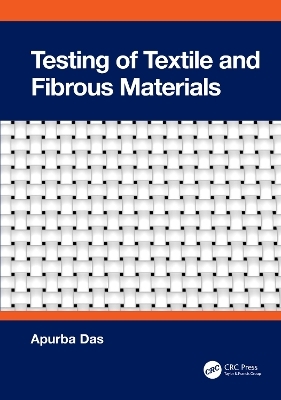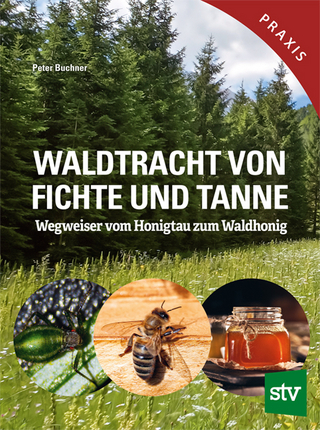
Testing of Textile and Fibrous Materials
CRC Press (Verlag)
978-1-032-55540-9 (ISBN)
This book contains detailed knowledge about testing principles of fibre, yarn, and fabric characteristics, the tensile characteristics of materials and testing of fibrous-composites and technical textiles. It starts with an introduction to textile testing and further covers moisture in relation to textile materials, sampling techniques for textile materials and the basic applied statistics, fibre characteristics, fibre length, cotton fibre fineness and maturity characteristics. It also deals with the advanced characterisation of cotton fibre by using HVI and AFIS systems.
Features:
It covers the principles of the testing of textile and fibrous materials along with modern techniques for testing textile materials
It reviews all necessary topics related to fibre, yarn, fabric, technical textiles, and composite testing
It explores the tensile characteristics of textile materials and measurement principles
It discusses low-stress mechanical characteristics and transmission characteristics
It includes a large number of examples and exercises based on actual industrial conditions worldwide including solutions
This textbook is aimed at senior undergraduate students in textile testing and evaluation of textile materials.
Apurba Das is Professor in the Department of Textile and Fibre Engineering and Institute Chair Professor, Indian Institute of Technology, New Delhi, India. He has more than 25 years of teaching and research experience. He has guided many Ph.D., M. Tech., B. Tech. students and is presently guiding several students. He has published more than 300 research papers and edited/written several books/monographs and written many chapters in books. He has successfully completed more than 55 research projects from government funding agencies and carried out many consultancy projects from industries. He has developed several instruments for characterisation of textile materials and filed 17 patent applications. His main areas of teaching and research interest are evaluation of textile materials, clothing comfort, nonwovens, technical textiles, protective textiles, fibre reinforced composites, etc. He is the recipient of Teaching Excellence Award. He has international research collaborations with universities from different countries like, Germany, Poland, Hungary, Slovenia, Italy, Portugal, China, South Korea, UK, Hong Kong, Croatia and the like.
Chapter 1. Introduction to Textile Testing. 1.1 The Need for Textile Testing. 1.2 The Need for Standardization in Testing. Chapter 2. Sampling of Textile Materials. 2.1 Understanding Sampling. 2.2 The Sampling of Textile Materials. 2.3 Practical Statistics. Exercises. Chapter 3. Fibre Length. 3.1 Introduction. 3.2 Importance of Fibre Length Measurement. 3.3 Expressions of Fibre Length. 3.4 Methods of Length Measurement of Cotton. 3.5 Expressions of Fibre Length Variation. 3.6 Wool Fibre Length Measurement. Exercises. Chapter 4. Fibre Fineness and Maturity. 4.1 Introduction. 4.2 Fibre Fineness. 4.3 Cotton Fibre Maturity. Exercises. Chapter 5. Moisture in Textiles. 5.1 Introduction. 5.2 Terms Related to Moisture. 5.3 Measurement Techniques. 5.4 Effect of Presence of Moisture on Fibre Properties. Exercises. Chapter 6. Advanced Characterizations of Cotton Fibre. 6.1 Introduction. 6.2 High Volume Instrument (HVI). 6.3 Advance Fibre Information System (AFIS). Exercises. Chapter 7. Yarn Linear Density. 7.1 Introduction. 7.2 Yarn Numbering Systems. 7.3 Folded Yarn Count. 7.4 Measurement of Yarn Linear Density. Exercises. Chapter 8. Hairiness of Textile Materials. 8.1 Introduction. 8.2 Causes of Hairiness. 8.3 Effects of Hairiness. 8.4 Yarn Hairiness Measurement. 8.5 Fabric Hairiness Measurement. Exercises. Chapter 9. Evenness of Fibrous Strands. 9.1 Introduction. 9.2 Types of Irregularities. 9.3 Terminologies Related to Irregularity. 9.4 Addition and Reduction of Irregularity. 9.5 Causes of Irregularities. 9.6 Effects of Irregularity. 9.7 Classification of Variation. 9.8 Measurement of Evenness. Exercises. Chapter 10. Yarn Twist. 10.1 Introduction. 10.2 Effects of Twist. 10.3 Applications of Twist. 10.4 Expressions of Twist Level. 10.5 Methods of Measurement of Twist. Exercises. Chapter 11. Tensile Characteristics. 11.1 Introduction. 11.2 Tensile Terminologies. 11.3 Factors Affecting the Tensile Characteristics. 11.4 Factors Affecting the Tensile Test Results. 11.5 Principles of Tensile Testing. 11.6 Fibre Strength Measurement. 11.7 Yarn Strength Measurement. 11.8 Pendulum Lever Principle. 11.9 Lea Strength in Skein Form. 11.10 Fabric Strength Measurement. Exercises. Chapter 12. Bursting and Tear Characteristics. 12.1 Introduction. 12.2 Bursting Strength. 12.3 Tear Strength. Exercises. Chapter 13. Pilling and Abrasion Characteristics. 13.1 Introduction. 13.2 Pilling Characteristics. 13.3 Abrasion Characteristics. Exercises. Chapter 14. Low Stress Mechanical Characteristics of Fabrics. 14.1 Introduction. 14.2 Bending Characteristics. 14.3 Shear Characteristics. 14.4 Drape Characteristics. 14.5 Interdependence of Bending, Shear and Drape. 14.6 Frictional Characteristics. 14.7 Compression Characteristics. 14.8 Objective Assessment Systems. Exercises. Chapter 15. Transmission Characteristics of Textiles. 15.1 Introduction. 15.2 Air Transmission. 15.3 Moisture Transmission. 15.4 Heat Transmission. Exercises. Chapter 16. Apparel Testing. 16.1 Introduction. 16.2 Dedicated Tests for Apparel and Its Assemblies. Exercises. Chapter 17. Testing of Technical Textiles. 17.1 Introduction. 17.2 Testing of Geotextiles. 17.3 Testing of Filter Fabrics. 17.4 Testing of Protective Textiles. Exercises. Chapter 18. Testing of Fibrous Composites. 18.1 Introduction. 18.2 Destructive Tests. 18.3 Non-destructive Tests. Exercises.
| Erscheinungsdatum | 20.04.2024 |
|---|---|
| Zusatzinfo | 14 Tables, black and white; 300 Line drawings, black and white; 7 Halftones, black and white; 307 Illustrations, black and white |
| Verlagsort | London |
| Sprache | englisch |
| Maße | 178 x 254 mm |
| Gewicht | 930 g |
| Themenwelt | Naturwissenschaften ► Biologie |
| Technik ► Umwelttechnik / Biotechnologie | |
| ISBN-10 | 1-032-55540-8 / 1032555408 |
| ISBN-13 | 978-1-032-55540-9 / 9781032555409 |
| Zustand | Neuware |
| Informationen gemäß Produktsicherheitsverordnung (GPSR) | |
| Haben Sie eine Frage zum Produkt? |
aus dem Bereich


